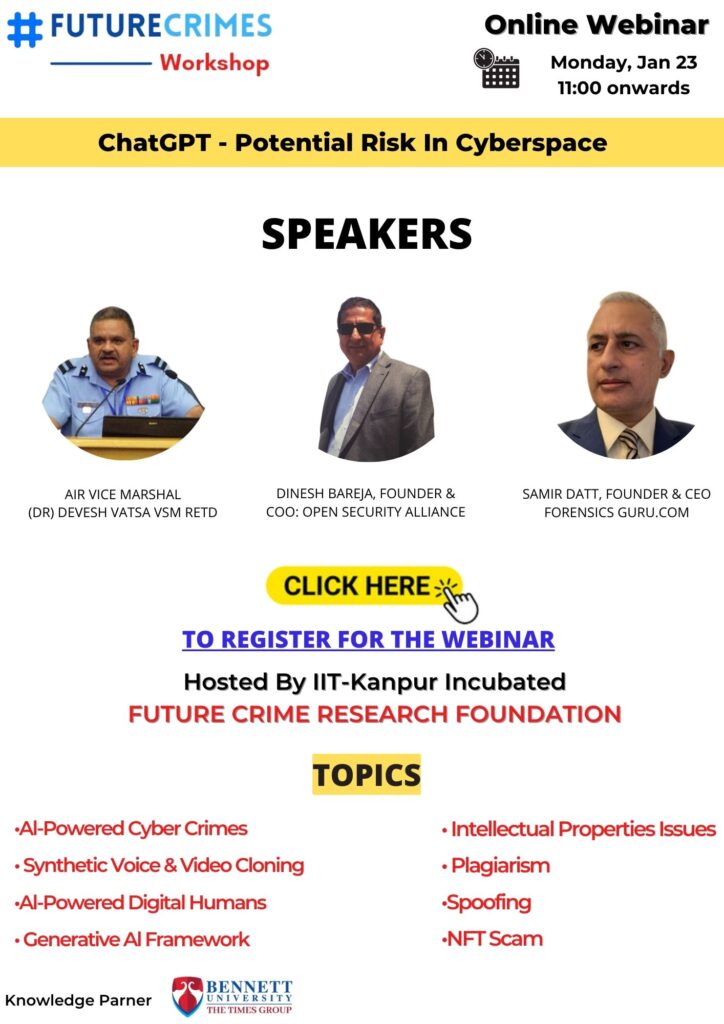NEW DELHI: To raise awareness about the potential risks of ChatGPT in cyberspace, IIT Kanpur incubated – the Future Crime Research Foundation (FCRF) and Bennett University is hosting a virtual event on January 23, Monday at 11:00 am. The webinar, which is open to the public, will feature a panel of experts who will discuss various aspects of ChatGPT and its impact on cybersecurity.
The keynote speaker for the event will be Air Vice Marshal (Dr) Devesh Vatsa VSM Retd, a renowned expert on cyber defense and information security. He will be joined by Dinesh Bareja, Founder & COO: Open Security Alliance, who will discuss the ethical implications of using ChatGPT in the business world. Samir Datt, the founder and CEO of Forensics Guru.com, will also be present to provide insights into the forensic challenges posed by ChatGPT in the field of cybercrime investigation.
The FCRF, a non-profit organization dedicated to promoting cyber resilience and the responsible use of technology, believes that it is important to educate the public about the potential risks of ChatGPT in cyberspace. The event is hosted along with the Bennett University, who are knoledge partner for the webinar.

“As ChatGPT is becoming more prevalent in various industries and sectors, it is crucial that we understand the potential risks and take steps to mitigate them,” said Shashank Shekhar, co-founder of FCRF, who will moderate the session.
Interested participants can register for the event by using the link. The event is open to the public, and anyone with an interest in cybersecurity and the future of technology is encouraged to attend.
What is ChatGPT
ChatGPT (Conversational Generative Pre-trained Transformer) is a large language model developed by OpenAI. It is a neural network-based system that has been trained on a massive amount of text data, allowing it to generate human-like text in a variety of languages and formats. This makes it useful for a wide range of applications, such as natural language processing, text generation, and language translation.
However, with the increasing use and dependence on ChatGPT, potential threats also need to be considered. Some of the potential risks of ChatGPT include:
Misinformation: ChatGPT has the ability to generate text that is indistinguishable from that written by a human. This means that it can be used to create fake news, propaganda, and other forms of misinformation.
Privacy concerns: ChatGPT requires access to large amounts of data in order to function. This data can include personal information, which raises concerns about the privacy and security of individuals.
Bias: ChatGPT is trained on the data it is fed. If the data is biased, the model will also learn and replicate that bias, which can perpetuate and amplify inequalities in society.
Cybersecurity threat: ChatGPT could be used by cybercriminals and hackers to launch phishing and other cyber attacks.
Job displacement: ChatGPT can be used to automate certain tasks, such as writing and language translation, which could lead to job displacement.
It’s important to consider these potential risks and take steps to mitigate them in order to ensure that ChatGPT is used responsibly and ethically.
Follow The420.in on
Telegram | Facebook | Twitter | LinkedIn | Instagram | YouTube



